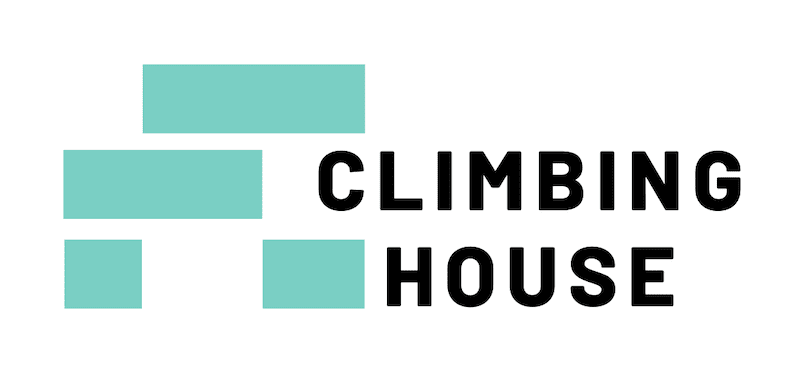The 9 Best Liquid Chalk for Climbing (2024 Buying Guide)
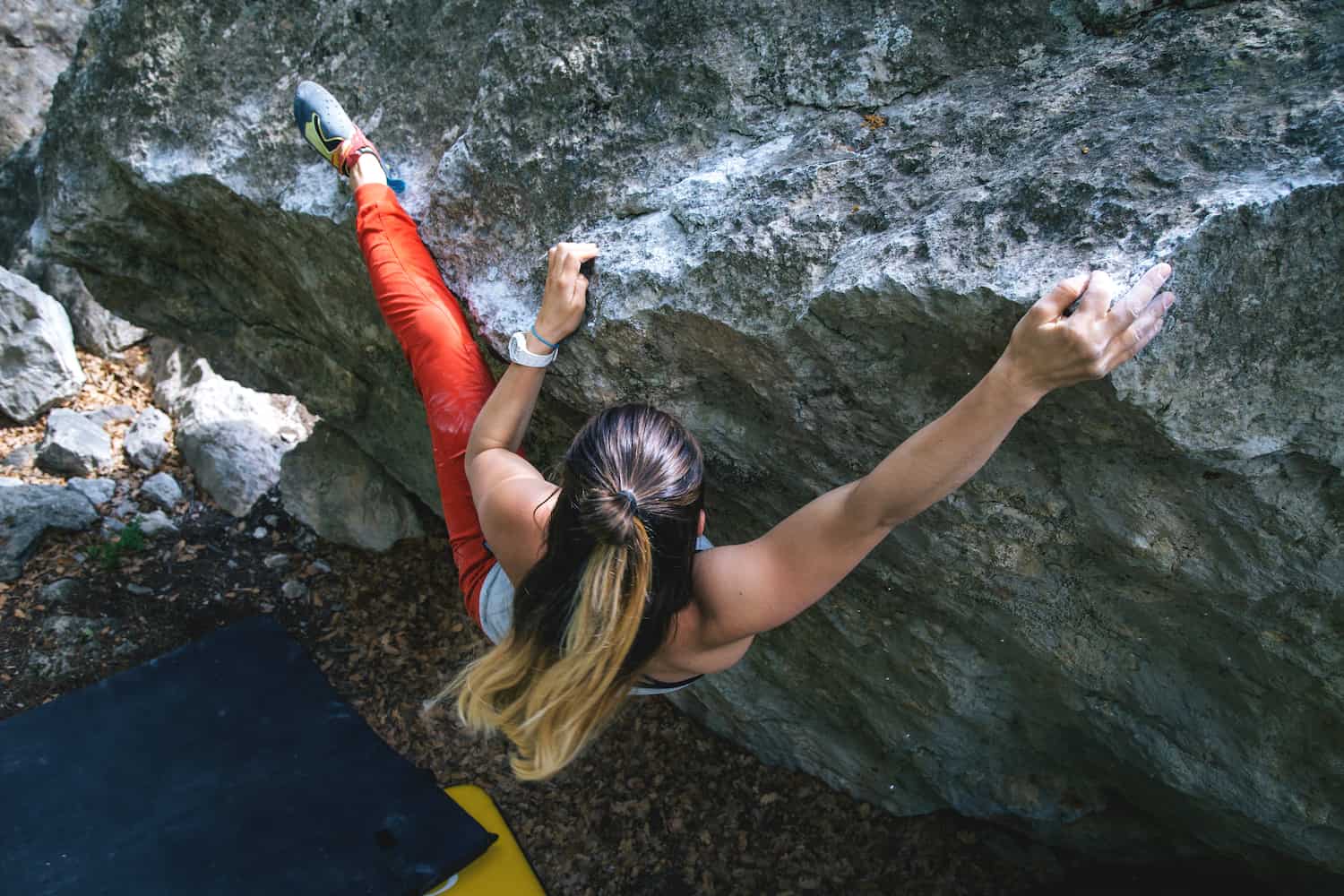
If you usually prefer powder chalk but are considering switching to liquid, then reading our review of the best liquid chalk for climbing is a great place to start. Whether you’re a stalwart climber or you live for bouldering, there’s nothing worse than trying to master difficult rock climbing holds and conquer your crux with slippery, sweaty tips. Many rock climbers (and weightlifters, gymnasts, even pole dancers) use liquid chalk to combat the problem of sweaty palms and fingertips.
We’ve got the whole rundown for you right here on liquid climbing chalk, so keep reading to find out more about which brands and products will suit your needs best. We’ll also discuss liquid vs. dry, how to use liquid chalk when climbing, and how to make your own liquid chalk (hint: it’s surprisingly simple).
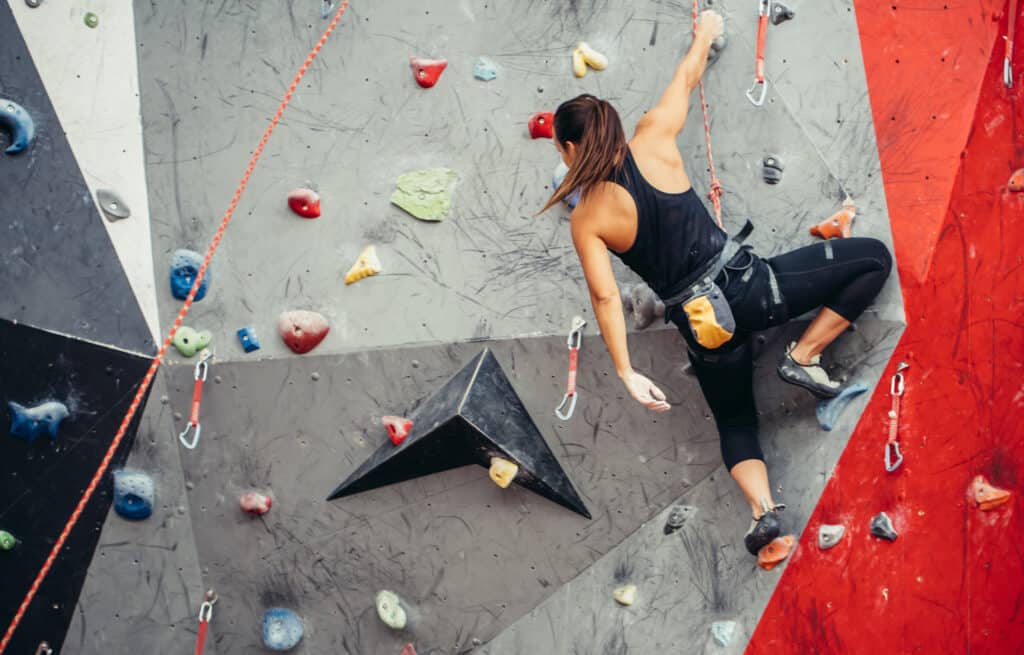
The Best Liquid Chalks for Climbing
Without further ado, we’re going to review nine different liquid chalks. Then, we’ll let you know our decision on the best liquid chalk for climbing out of the bunch.
Comparison Table
| Name | Sensitive skin | Score | Texture | Rosin | Best offer |
|---|---|---|---|---|---|
Friction Labs Secret Stuff Alcohol-Free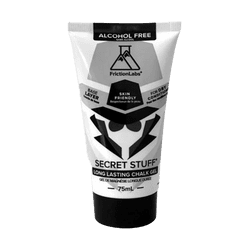 | ✓ | ★★★ | Thick | x | |
Friction Labs Secret Stuff 80% Alcohol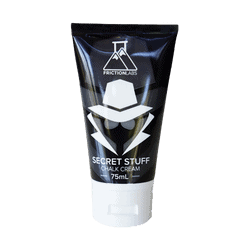 | x | ★★★ | Thick | x | Check Prices |
Fire Team Fit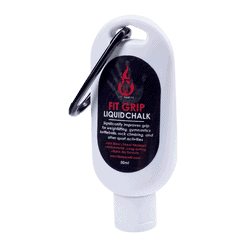 | x | ★★★ | Thick | ✓ | |
Black Diamond Liquid White Gold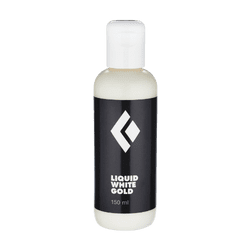 | x | ★★ | Thin | ✓ | Check Prices |
Black Diamond Liquid Black Gold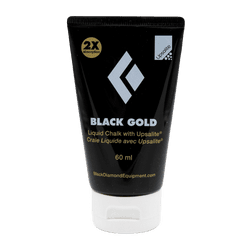 | ✓ | ★★★ | Regular | x | Check Prices |
Evolv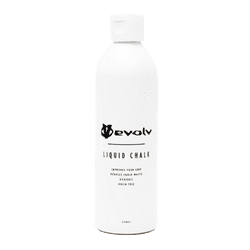 | x | ★★ | Thin | ✓ | Check Prices |
Petzl Power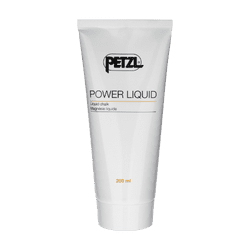 | x | ★★ | Thin | ✓ | |
Mammut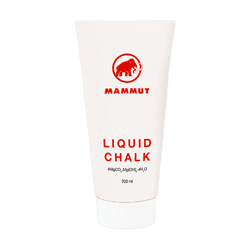 | x | ★★ | Thick | ✓ | |
Metolius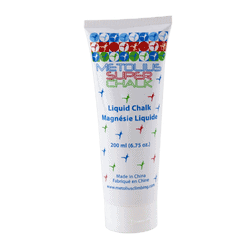 | x | ★ | Regular | ? |
1. Friction Labs Secret Stuff Alcohol-Free Chalk Cream
Best Chalk For: Climbers with sensitive skin or hands full of cuts and lacerations
Current Cost: ~$19/75 ml
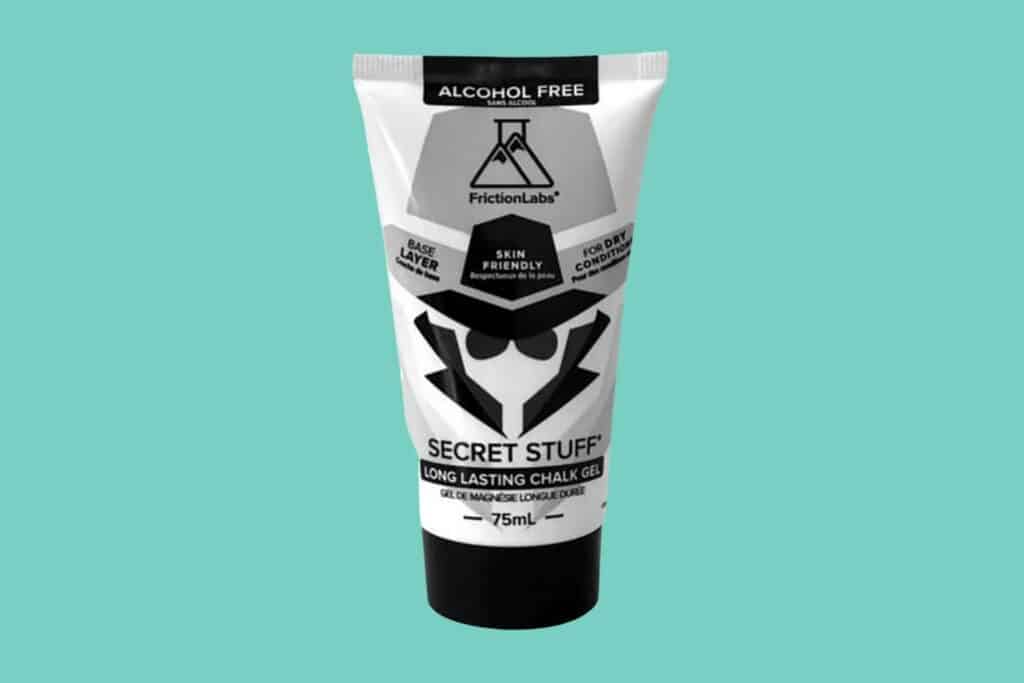
The Facts: Yes, Friction Labs is expensive, but if your skin is sensitive or full of cuts and abrasions, you really can’t beat it. The FL Secret Stuff Chalk Cream formula is alcohol-free, so there’s no risk of dry, irritated skin after your climb.
Secret Stuff is also odor-free and dust-free. It protects against sweat, oil, humidity, and rain, making it ideal for hot, dry climates.
This alcohol-free formula takes longer to dry, about 60-90 seconds. It’s safe, non-toxic, handcrafted in the USA, doesn’t contain harsh drying agents or additives (only organic compounds). Also, many climbers love the fact that it’s 100% vegan. It’s an excellent choice to replace a chalk bag completely in the gym.
What’s inside?
• Water
• Magnesium carbonate
• Hydroxypropyl starch phosphate (organic compound)
• Phenoxyethanol (organic compound)
• Ethylhexylglycerin (natural preservative)
Pros
Cons
2. Friction Labs Secret Stuff 80% Alcohol Content Liquid Chalk
Best Chalk For: Overall best performance
Current Cost: ~$19/75 ml
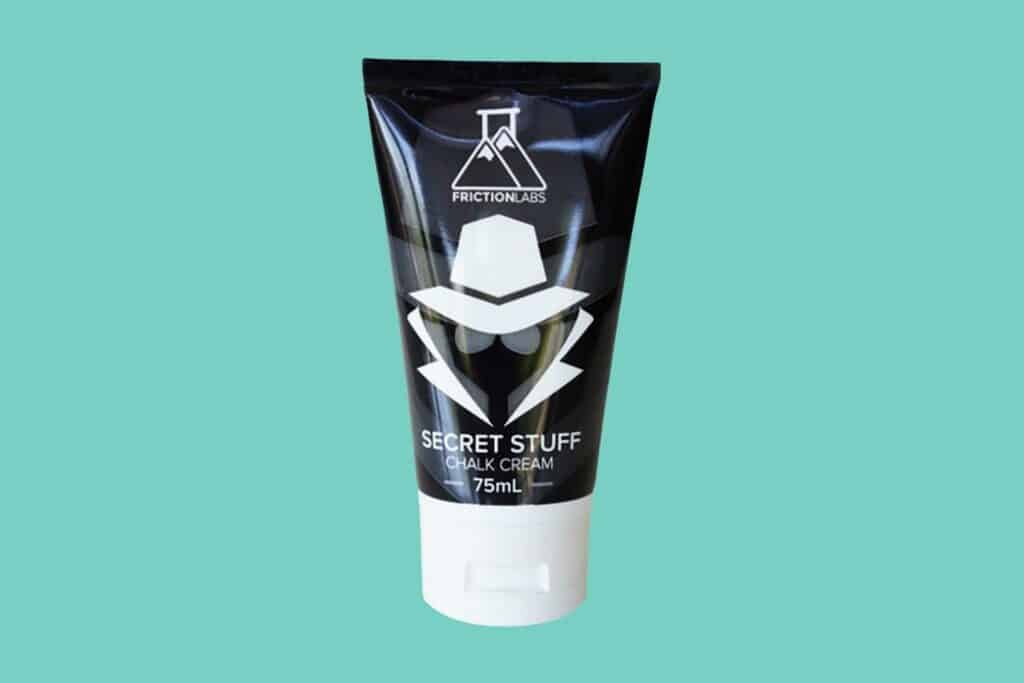
The Facts: Friction Labs Secret Stuff 80% Liquid Chalk is the original formula with added alcohol. Friction Labs products provide long-lasting performance because every formula contains lab-grade magnesium carbonate. As a result, Secret Stuff is more effective at drying sweaty hands than cheaper formulas containing calcium carbonate.
Another benefit of Friction Labs Secret Stuff is its ultra-fine quality chalk. The fine powder gets deep into the cracks and creases on your hands, providing more friction and better grip. This formula dries extremely fast, between five and 20 seconds. It’s safe, organic, non-toxic, handcrafted in the USA, doesn’t contain any additives, and is 100% vegan.
What’s inside?
• Magnesium carbonate
• Water
• Isopropyl alcohol
Pros
Cons
3. Fire Team Fit Liquid Chalk
Best Chalk For: Climbers who need extreme grip
Current Price: ~$11.99/50 ml
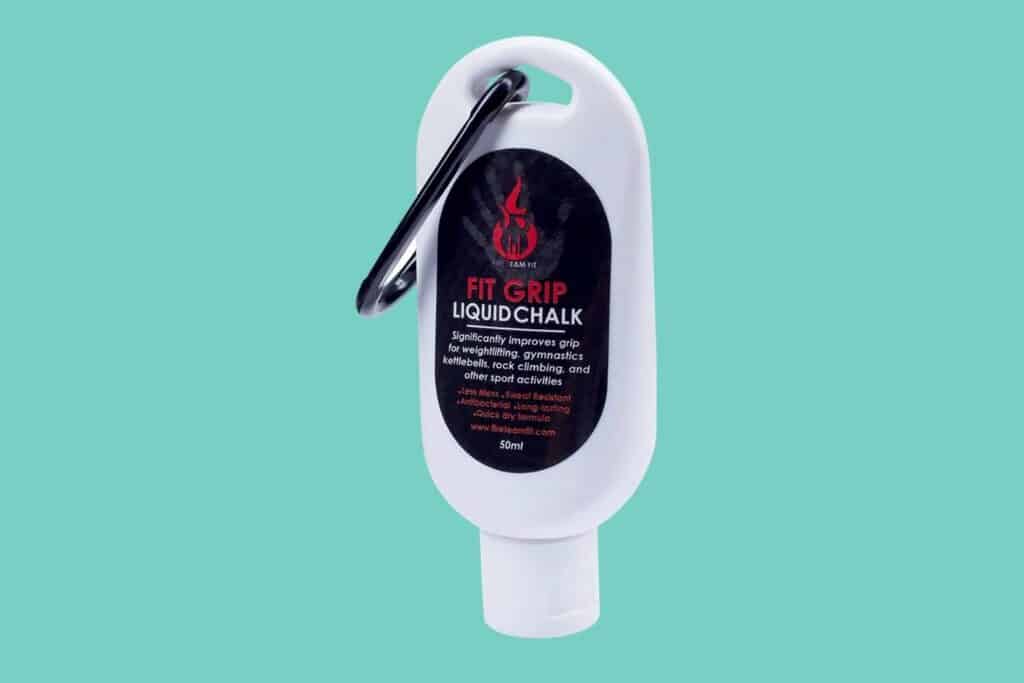
The Facts: While Fire Team Fit Liquid Chalk may be the favorite chalk of weightlifters everywhere, it’s also great for rock climbing and bouldering. The moisture-resistant, antibacterial formula is ideal for climbers who sweat profusely. It keeps hands dry and incredibly grippy even in humid conditions. Fire Team is a small, veteran-owned business that doesn’t test on animals.
However, some people have found that this liquid chalk almost adds too much extra grip, causing blisters or torn skin if your grip slips. Also, the thicker formula may flake off after drying or even form small chunks when your hands sweat. Unfortunately, it contains rosin, which is a resinous sap that’s also an acute allergen. We couldn’t find whether this formula has an organic manufacturing process, but we did get a complete list of ingredients:
What’s inside?
• 85% magnesium carbonate
• 8.5% SD Alcohol
• 2.5% hydroxypropyl cellulose (binder)
• 4% colophonium (rosin)
Pros
Cons
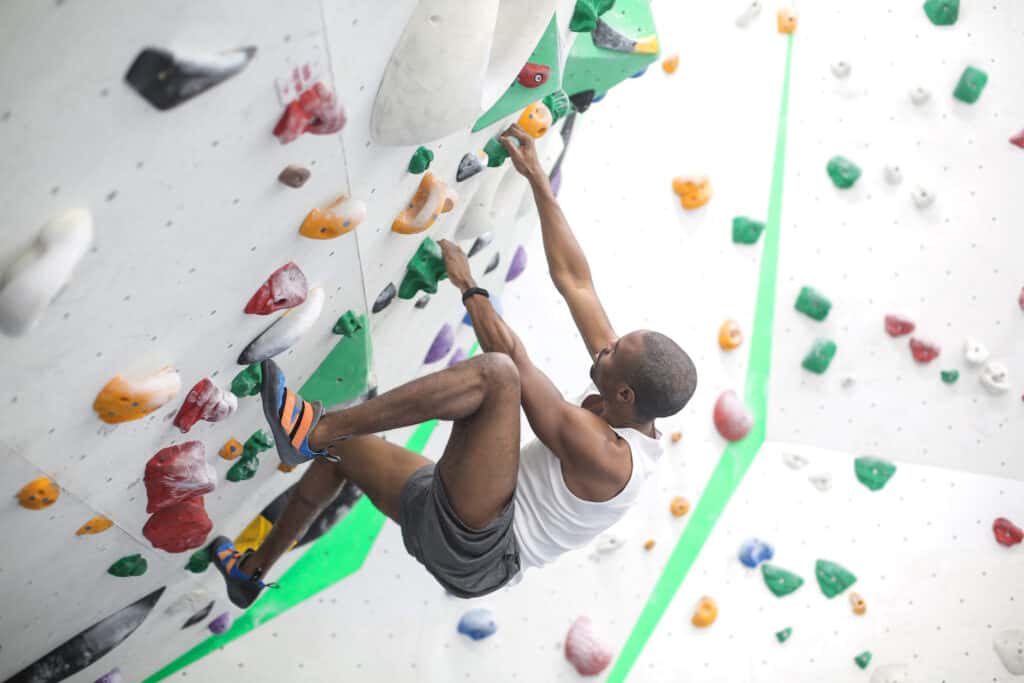
4. Black Diamond Liquid White Gold
Best Chalk For: Climbers with overly sweaty skin
Current Price: ~$13.95/150 ml
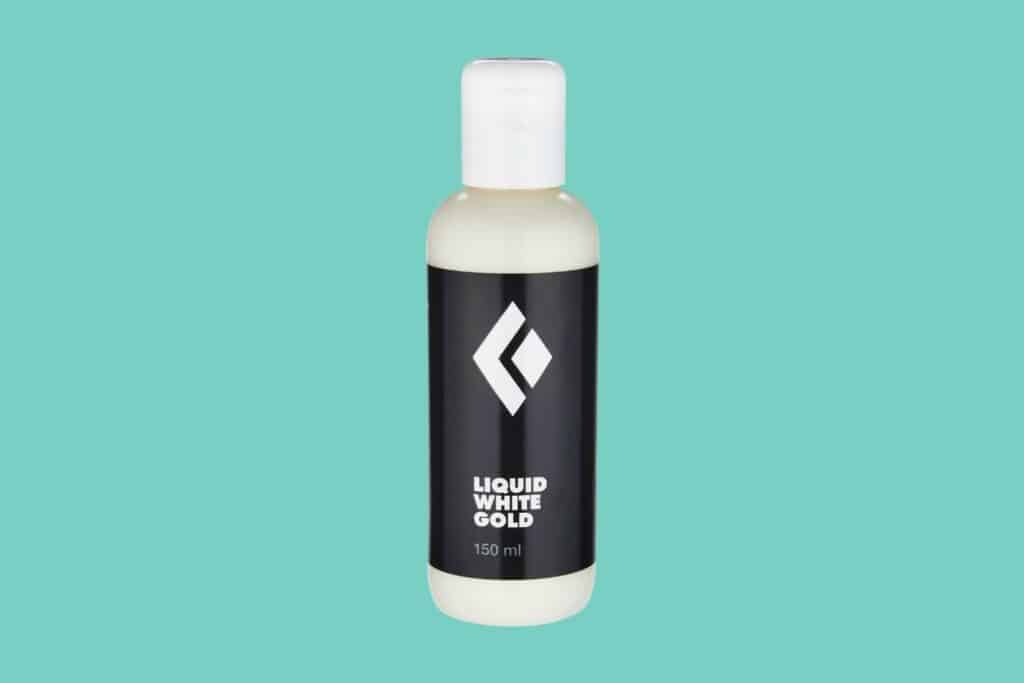
The Facts: Black Diamond White Gold is the perfect choice if you suffer from extra sweaty hands during your climb. White Gold is mess-free and won’t leave chalk marks on your clothes or equipment.
This particular formula is ideal for indoor gyms, humid conditions, and redpoints. White Gold liquid climbing chalk provides excellent performance and quickly dries sweat before it can affect your climb.
The formula is 100% vegan, and organic. However, it does contain rosin and some climbers report that it has a thin consistency. They also say that while it dries fast and adds grip, it doesn’t last that long before it needs reapplying. The ingredients include:
What’s inside?
• 70% ethanol alcohol
• Chalk
• Water
• Rosin
Pros
Cons
5. Black Diamond Liquid Black Gold
Best Chalk For: Climbers with extremely dry skin
Current Price: ~$19.95/60 ml
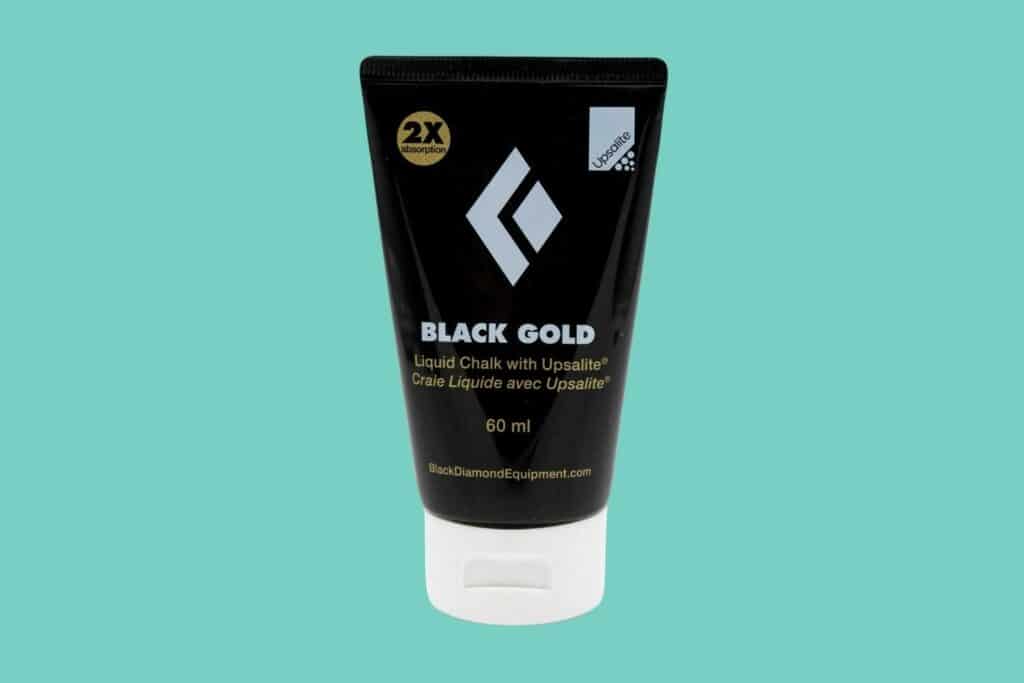
The Facts: Black Diamond Liquid Black Gold climbing chalk is the best liquid chalk for climbing if you suffer from dehydrated skin. Black Diamond’s lab scientifically engineered the White Gold formula to include a 10% solution of Pure Gold Upsalite, the world’s only porous magnesium carbonate. The porous nature of Upsalite makes it hyper-absorbent. Black Diamond claims that it gives the Black Gold formula twice as much moisture as other chalks.
If you’re going through buckets of lotion to keep your hands moisturized after using liquid chalk, then Black Gold is the best liquid climbing chalk for you. Yes, it’s pricey, but in our opinion, the added moisture retention and hydration are worth it.
What’s inside?
• 70% ethanol
• 20% water
• 10% Upsalite (non-organic synthetic compound)
Pros
Cons
6. Evolv Liquid Chalk
Best Chalk For: Climbers who want a natural liquid chalk formula with no additives
Current Price: ~$19.95/250 ml
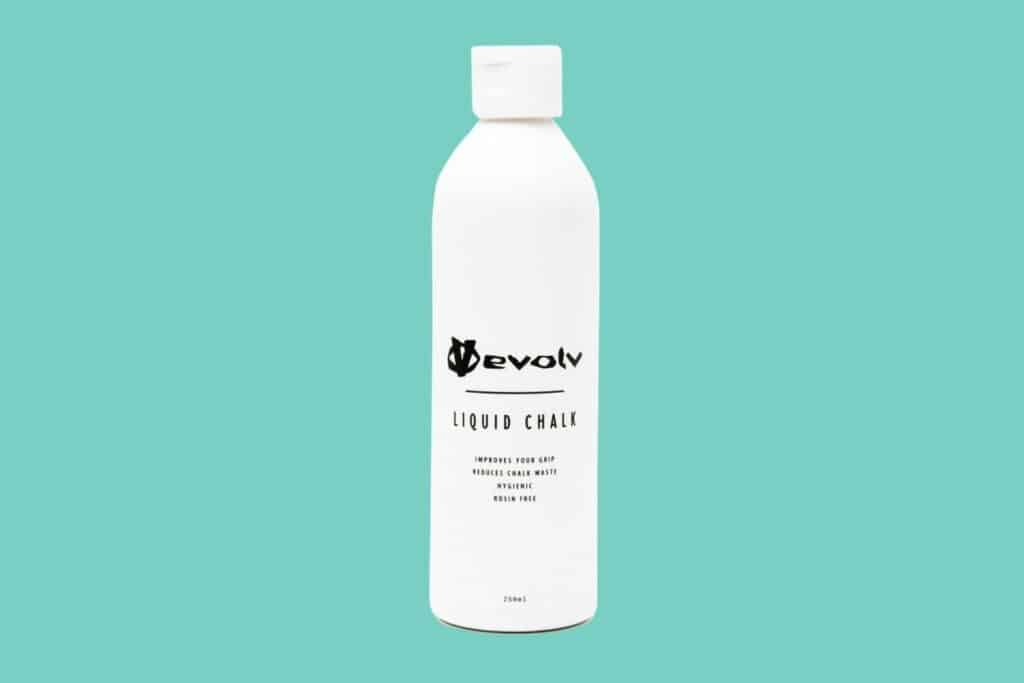
The Facts: Evolv Liquid Chalk is the best chalk option for climbing if you prefer a formula with no additives, fillers, or artificial drying agents.
At only $19.95 for 250 ml, this liquid chalk is also an excellent choice for climbers on a limited budget. If you’re saving for a sweet crash pad or new gear, Evolv will make your dollars go a little further. The formula contains 80% ethanol, pure magnesium carbonate, and water, meaning it meets CDC guidelines for sanitizing and effectively killing the novel coronavirus.
Because it contains a high percentage of alcohol, Evolv dries quickly and may cause skin irritation, but many climbers feel that the increased grip is worth it. Another benefit: the all-natural and organic formula doesn’t contain rosin. Many climbers don’t want liquid chalks with fillers, binders, and additives, which can be harsh on the skin and harmful to the environment.
Pros
Cons
7) PETZL Power Liquid Chalk
Best Chalk For: Climbers who want a clean, slightly tacky grip
Current Price: ~$14/200 ml
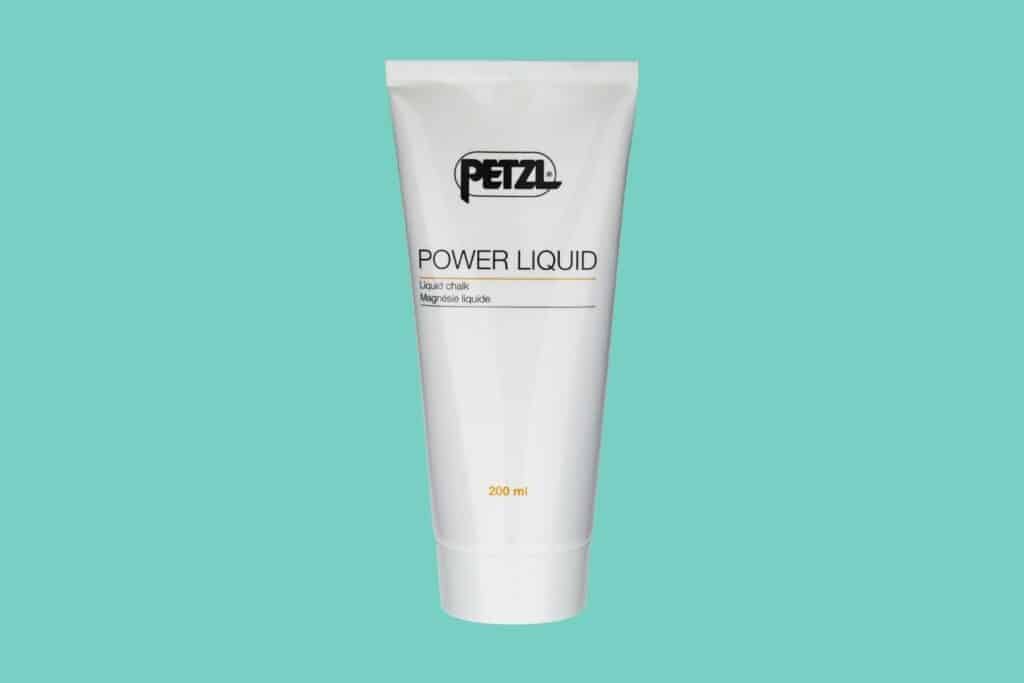
The Facts: PETZL Power Liquid Chalk is the best liquid product for climbing if you hate brands that leave your hands sticky or full of chunky, undissolved chalk. The non-organic formula does contain rosin, which may not be suitable for all climbers. Rosin is an acute allergen and may cause an adverse reaction in certain skin types.
However, the combination of ingredients does wonders for climbers who sweat profusely and prefer a thinner consistency gel that provides only a slightly tacky grip. In addition to forming a light, even base layer, the formula leaves no sticky residue. The high level of alcohol means it dries extremely quickly. The ingredients include:
What’s inside?
• Isopropyl alcohol
• Magnesium hydroxide carbonate
• Rosin (resinous sap from conifers)
• Hydroxypropyl cellulose (organic compound)
• Styrax benzoin gum (derived naturally)
Pros
Cons
8. Mammut’s Liquid Chalk
Best Chalk For: Climbers who prefer a thicker consistency formula
Current Price: ~$12.95/100 ml
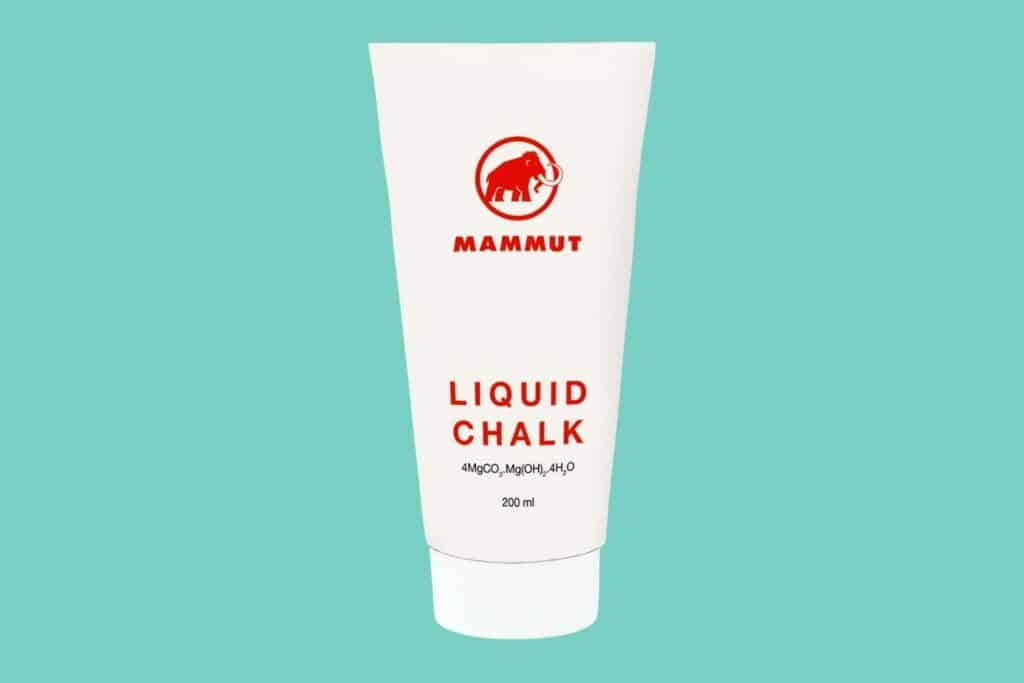
The Facts: Mammut Liquid Chalk is ideal for indoor use and is an excellent choice if you prefer a thicker consistency to your liquid chalk. It’s certainly thicker and more granular than most, but this provides an advantage for some climbers. Also, the dense formula creates a durable, long-lasting base coat that’s perfect for layering with loose chalk to improve your grip and performance.
Many climbers have found that it takes longer to dry because the creamy consistency is thicker than other chalk brands. However, we feel it’s definitely worth giving Mammut Liquid Chalk a try, particularly if you sweat profusely.
Depending on how much chalk you use, you may find that it leaves some residue on your clothes or equipment. However, for the price, Mammut Liquid Chalk isn’t a bad option. Unfortunately, the formula isn’t organic or additive-free. It also contains rosin and other filler-type substances. The ingredients in Mammut Liquid Chalk include:
What’s inside?
• Isopropyl alcohol
• Magnesium carbonate
• Styrax benzoin gum (resinous sap)
• Rosin (colophonium)
• Benzyl benzoate (solvent for cellulose derivatives)
• Hydroxypropyl cellulose (organic compound)
Pros
Cons
9. Metolius Liquid Super Chalk
Best Chalk For: Climbers on a budget
Current Price: ~$9.95/200 ml
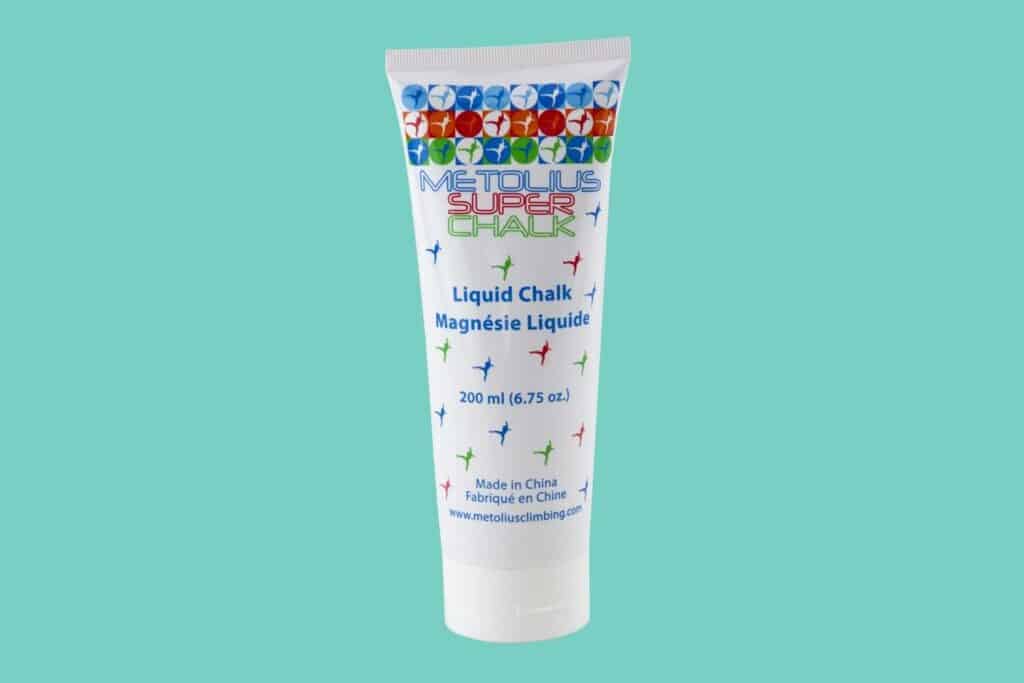
The Facts: It’s undeniable that Metolius Liquid Super Chalk provides the best value of all the chalk on our list. Metolius Super Chalk dries incredibly fast and is essentially the liquid form of the powdered Super Chalk, which is also inexpensive.
Climbers seem to find this one polarizing: some swear by it while others feel it doesn’t provide enough performance and doesn’t last. We couldn’t find a complete ingredient list, so we don’t know whether it’s organic, but Super Chalk does contain magnesium carbonate, water, and at least 70-80% ethanol.
If you can handle the alcohol, it’s an excellent value, and it provides a nice, even coating. In addition, it’s waste-free and contains the same drying agent as the powdered Super Chalk (the company alleges it’s the “perfect” drying agent).
Pros
Cons
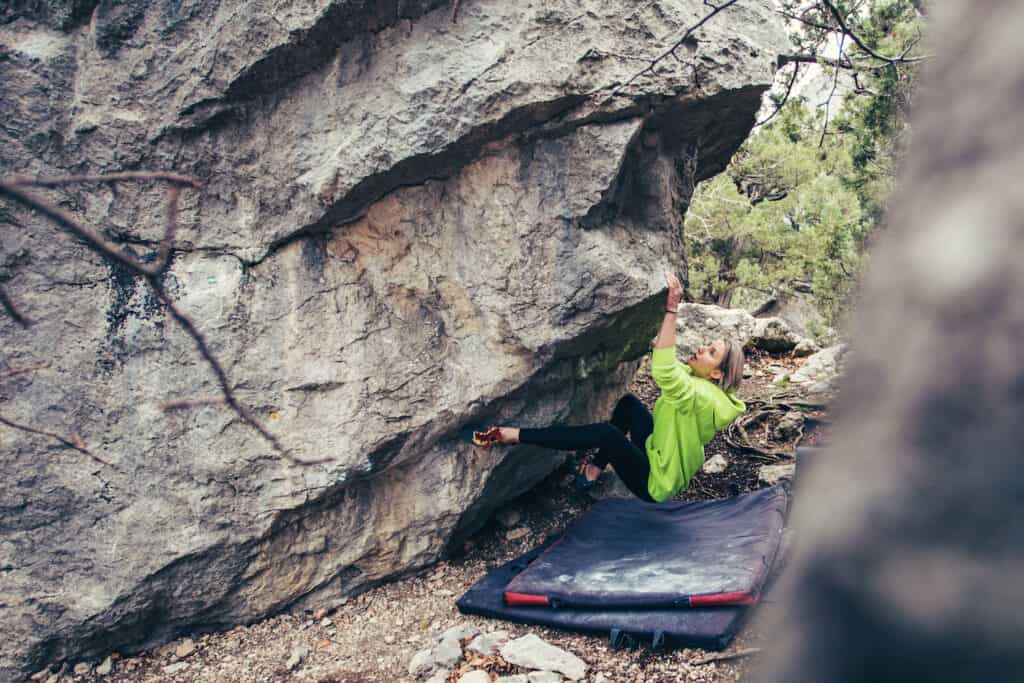
Honorable Mentions
We also wanted to give you the names of some other brands of liquid chalk that just missed our list. Ultimately, finding the best chalk is also a matter of personal preference. Why not try them out? After all, it’s a great excuse to go for a climb. Some honorable mentions include:
- Trango Nitroglycerin
- C.A.M.P.
- Grip God
- Survivor
- Edelweiss liquid chalk
- Liquid Grip
Our Verdict: The Best Liquid Chalk for Climbing
You really can’t go wrong with any of the liquid chalks on our list. Each has its benefits, and they’re all great for climbing and bouldering. However, we’d have to say our top pick for the best liquid chalk for climbing is a tie between Friction Labs 80% Alcohol Secret Stuff and Black Diamond Black Gold Liquid Climbing Chalk.
Friction Labs brings the best overall performance and superior quality, but Black Gold has near superhuman hydration power. It’s a toss-up, so try them both and see which you like best. Happy climbing, everyone!
What’s the Difference Between Dry and Liquid Climbing Chalks?
Standard climbing chalk is something that rock climbers everywhere use for extra grip and to eliminate the unwanted lubrication of sweat on their hands. Sweaty hands are incredibly dangerous because they can quickly loosen your grip, increasing the chance of a fall.
Many climbers use chalk bags full of loose chalk, but liquid chalk is steadily growing in popularity as a dust-free alternative to powder chalk.
Dry Chalk
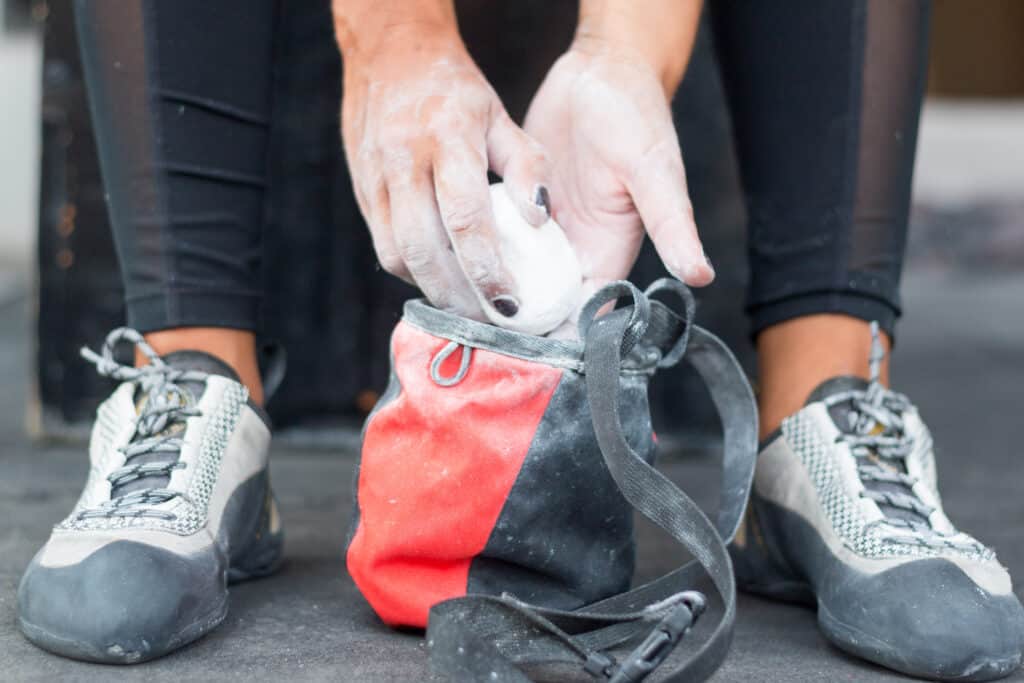
Dry chalk is more commonplace, and many climbers prefer finely powdered chalk because it does an excellent job drying very sweaty hands. Products like Friction Labs’ Unicorn Dust or Trango Gunpowder are especially popular. Most climbers have a chalk bag for their loose chalk that clips onto their belt. However, loose chalk is messy.
Chalk bags create large dust clouds, coating your clothes and inevitably creating a ton of waste. Breathing in fine chalk dust isn’t good for lung health, either. Even chalk balls can’t eliminate the dust, and it can be difficult getting enough powder out of a chalk ball on a climb. And let’s not talk about the risk of spilling your entire chalk bag in your rucksack on the way or back from your climbing session.
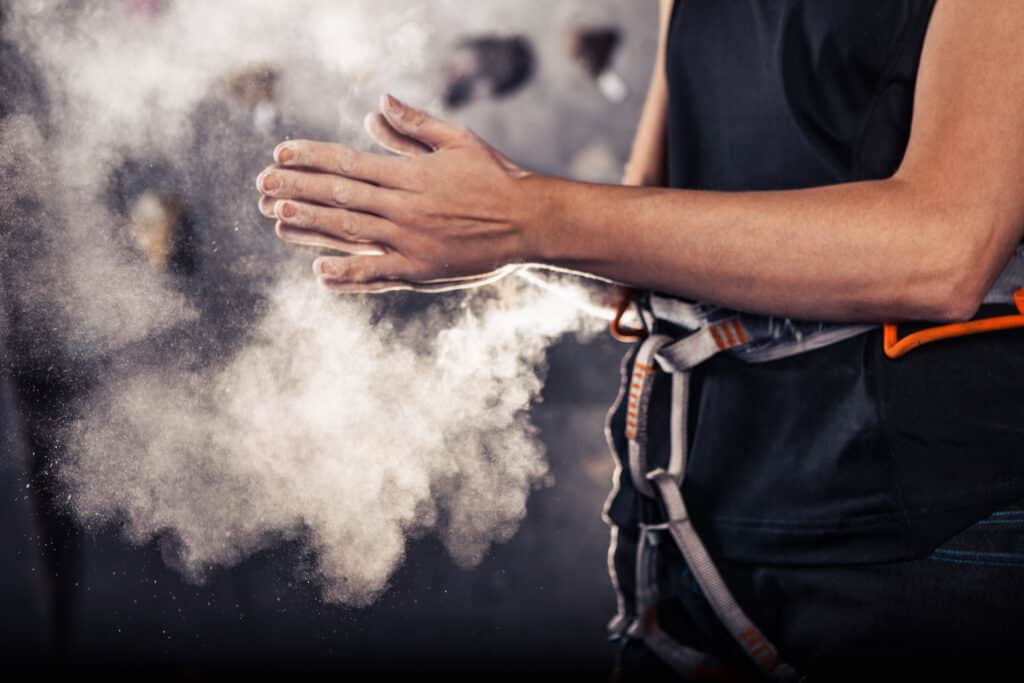
Regular chalk powder may not harm the environment, but it leaves glaring white marks on the rock. Climbers often feel that leftover tick marks ruin the natural beauty of the wilderness, which is the main appeal of rock climbing for many people. While liquid chalk doesn’t completely solve this problem, it does help to reduce the amount of chalk left after your climb.
Liquid Chalk
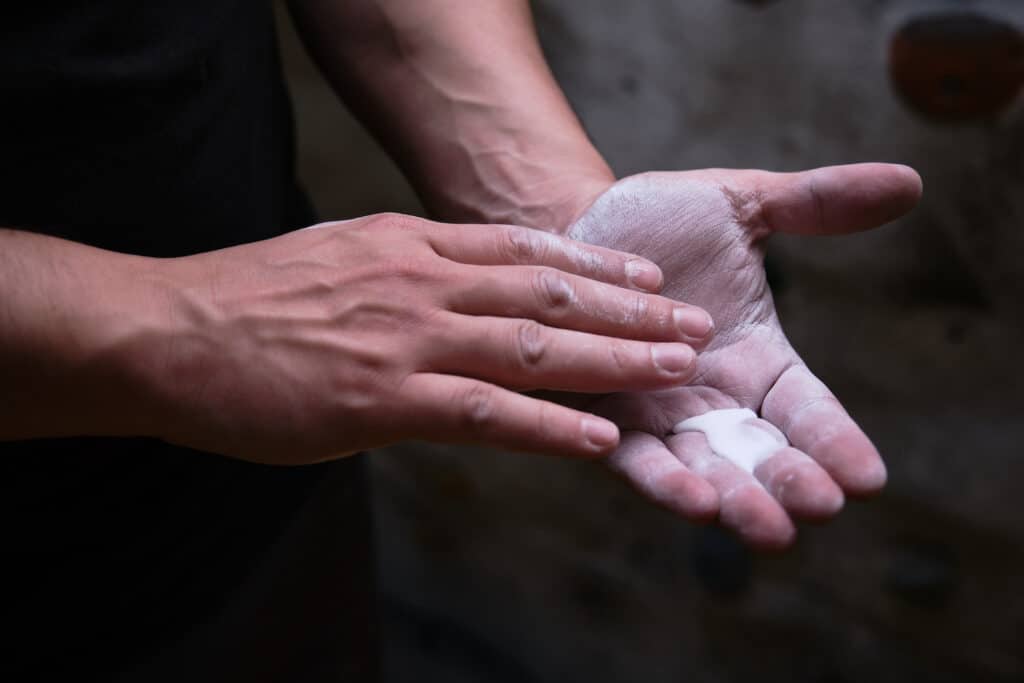
The liquid form of climbing chalk neatly solves the problem of the mess created by loose chalk. The wet texture allows the chalk to only go on your hands when you apply it instead of flying everywhere. Many climbing gyms have banned loose chalks in the hopes of eliminating the unavoidable and unsanitary mess left behind when people use powder chalk.
You’ll also find that you can take less with you on long climbing trips and spend less time suspended, chalking up your hands. Most times, you may only need to apply it once. It rubs in and evaporates quickly.
Furthermore, using liquid chalk is more environmentally friendly and less detrimental to your health. Liquid chalk also leaves less residue behind and is superior to standard chalk because it works longer in hot and humid conditions.
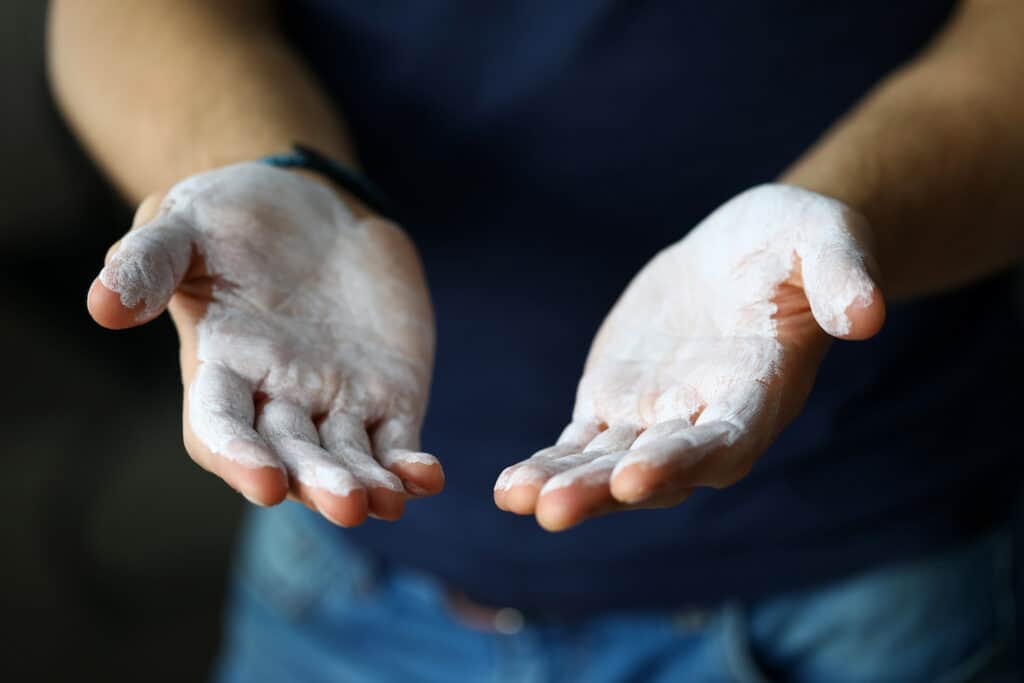
Most liquid chalk products contain three ingredients: magnesium carbonate (chalk), isopropyl alcohol or ethanol (the drying agent), and water.
However, the drying agents in liquid chalks that are so effective at reducing unwanted sweat can also cause redness or flaky, dry hands. In addition, liquid chalk isn’t safe to use if you have cuts or abrasions on your hands.
Last but not least, liquid chalk is mainly suitable for bouldering as, due to its format, it’s difficult to reapply during your long climbs. Even if you carry it in one of your pockets, you will not be able to open the bottle with just one hand. With its shorter routes, bouldering is ideal for wet chalk as one application is enough for an entire ascent.
Frequently Asked Questions (FAQs)
How to Use Liquid Climbing Chalk
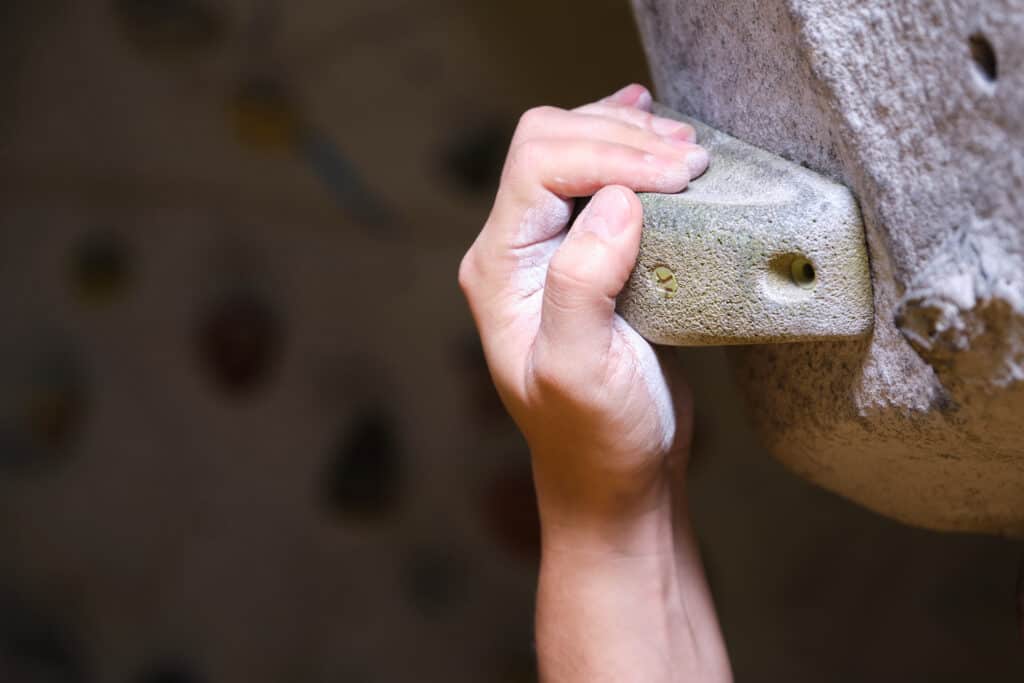
If you’ve never used liquid chalk before, it’s pretty fun to use. It goes on clear, but once it dries, it leaves a chalky white base coat. It forms a solid foundation for layering a thicker coating of loose chalk from a chalk ball.
To apply the liquid version of climbing chalk, start with clean, dry hands. Shake well, squeeze out a dime-sized dollop, then rub your hands together until you coat them evenly in a thin layer. Let the liquid chalk dry by blowing on it or waving your hands from side to side.
Liquid climbing chalk with alcohol dries within five to 20 seconds (or 90 seconds for alcohol-free formulas). You can use liquid chalk as a base layer in combination with dry powder or as a complete replacement.
How can I make my own climbing chalk?
To make liquid chalk, you’re going to need two things: chalk, and isopropyl alcohol (rubbing alcohol).
It takes only 3 steps to make it:
- Break down your chalk and grind it into a very fine powder
- Mix the chalk and the alcohol together. Be sure to use a product with 70% alcohol, not 99%.
- Pour the mixture into an airtight plastic container. Homemade liquid chalk doesn’t keep for long, so use the tightest container possible.
For detailed instructions, you can check out our easy DIY guide on how to make liquid chalk for climbing.
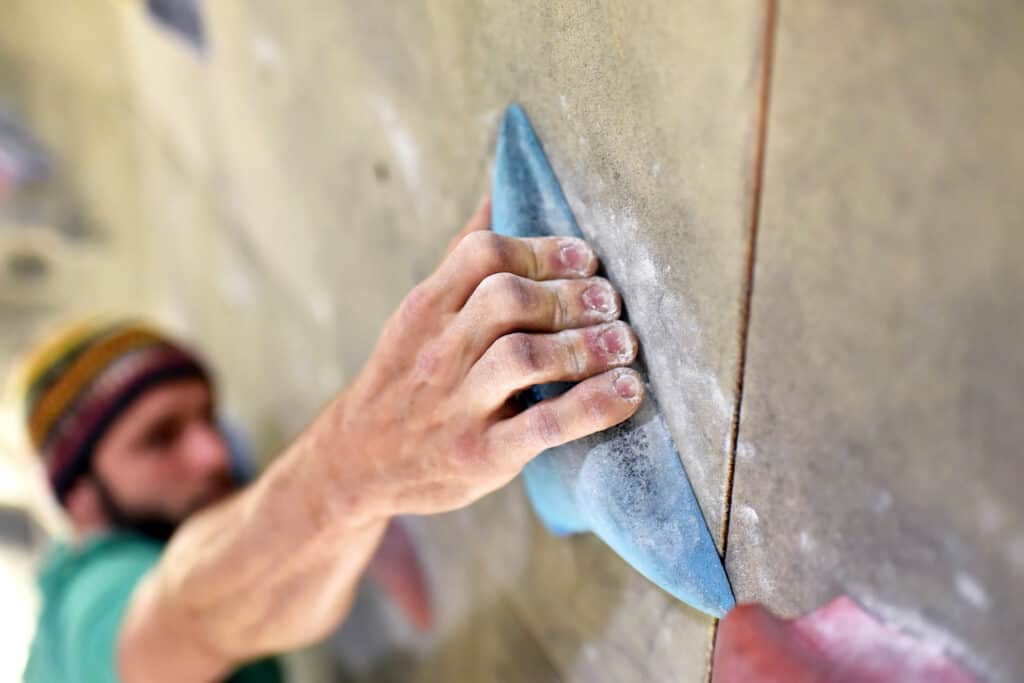
Does Liquid Chalk Kill Coronavirus?
You may not have known this, but there’s a unique benefit that comes from using liquid chalk compared with other chalks, particularly if you frequent indoor climbing gyms. Research has proven that the combination of magnesium carbonate and alcohol (a.k.a. climbing chalk in its liquid form) effectively kills novel coronavirus.
For the liquid chalk to be an effective sanitizer, it must contain alcohol, ideally 70-80%. Other liquid chalks with low or no alcohol won’t do the trick. Liquid chalk with a high alcohol content can cause dry skin, but so can hand sanitizer. Plus, you can quickly remedy dry skin with moisturizer.
